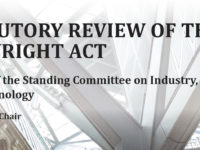The debate over copyright and digital locks – technically referred to as anti-circumvention legislation – dates back more than 25 years with creation of the World Intellectual Property Organization’s Internet Treaties and later in Canada with the enactment of the Copyright Modernization Act. The full scope and application of those digital lock rules has been the subject of considerable controversy, particularly over how fair dealing fits into the equation. The Federal Court of Canada recently issued a landmark decision on the issue which concludes that digital locks should not trump fair dealing. CIPPIC, the University of Ottawa’s public interest technology law clinic, raised the key arguments on the issue in an intervention in the case led by James Plotkin, a partner with the law firm Gowlings, and David Fewer, CIPPIC’s Director and General Counsel. They join the Law Bytes podcast to talk about the ruling and to clear up some of the misinformation that has been circulating since its release.
Post Tagged with: "digital locks"
Huge Win for Copyright User Rights in Canada: Federal Court Rules Digital Lock Rules Do Not Trump Fair Dealing
The Federal Court has issued a landmark decision (Blacklock’s Reports v. Attorney General of Canada) on copyright’s anti-circumvention rules which concludes that digital locks should not trump fair dealing. Rather, the two must co-exist in harmony, leading to an interpretation that users can still rely on fair dealing even in cases involving those digital locks. The decision could have enormous implications for libraries, education, and users more broadly as it seeks to restore the copyright balance in the digital world. The decision also importantly concludes that merely requiring a password does not meet the standard needed to qualify for copyright rules involving technological protection measures. If this all sounds technical, this post provides the necessary background and then reviews the decision.
Canadian Copyright Digital Lock Rules Finally Open to Reform?: Right to Repair and Interoperability Exceptions Advancing in House of Commons
Canadian anti-circumvention laws (also known as digital lock rules) are among the strictest in the world, creating unnecessary barriers to innovation and consumer rights. The rules are required under the World Intellectual Property Organization’s Internet Treaties, but those treaties leave considerable flexibility in how they should be implemented. This is reflected in the countless examples around the world of countries adopting flexible anti-circumvention rules that seek to maintain the copyright balance. Canada was pressured into following the restrictive U.S. approach in 2012, establishing a framework is not only more restrictive than required under the WIPO treaties, but even more restrictive than the U.S. system.
One of the biggest differences between Canada and the U.S. is that the U.S. conducts a review every three years to determine whether new exceptions to a general prohibition on circumventing a digital locks are needed. This has led to the adoption of several exceptions to TPMs for innovative activities such as automotive security research, repairs and maintenance, archiving and preserving video games, and for remixing from DVDs and Blu-Ray sources. Canada has no such system as the government instead provided assurances that it could address new exceptions through a regulation-making power. In the decade since the law has been in effect, successive Canadian governments have never done so. This is particularly problematic where the rules restrict basic property rights by limiting the ability to repair products or ensure full interoperability between systems.
Industry Committee Recommends Adding Digital Lock Exception to USMCA Copyright Provisions
The Standing Committee on Industry, Science and Technology has released its recommendations for changes to Bill C-4, the bill designed to implement the Canada-US-Mexico Trade Agreement. I appeared before the committee and used this week’s Lawbytes podcast to highlight some of the discussion. The committee had a limited time to study the bill, but arrived at some important recommendations on the copyright and digital policy provisions.
First, it recommended adding a new exception to Canada’s digital lock rules to address concerns in the agriculture sector about the right to repair their equipment. The issue has been gaining momentum around the world as many identify the over-broad restrictions often associated with anti-circumvention laws. The recommendation:
The LawBytes Podcast, Episode 16: The Copyright Review Report – Carys Craig on the Roadmap for the Future of Canadian Copyright Law
In December 2017, the Canadian government launched its much-anticipated and much-lobbied review of Canadian copyright law, tasking the Standing Committee on Industry, Science and Technology to lead the way. After months of study and hundreds of witnesses and briefs, the committee released its authoritative report with 36 recommendations earlier this month. Carys Craig, a law professor at Osgoode Hall Law School and one of Canada’s leading copyright law experts, joins the podcast to help sort through the report and to consider what it means for the future of Canadian copyright law.











